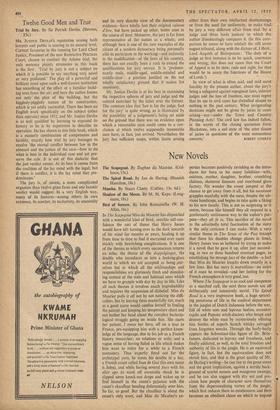Twelve Good Men and True
Ma. JUSTICE DEVLIN'S reputation among both lawyers and public is soaring to its natural level. Current favourite in the running for Lord Chief Justice, President of the new Restrictive Practices Court, chosen to conduct the Adams trial, the only sentence plainly erroneous in this book is the first : 'Trial by jury is not a subject on which it is possible to say anything very novel or very profound.' The play of a powerful and brilliant mind upon such a well-known institution has something of the effect of a familiar build- ing seen frpm the air; and here the author knows not only' the plan of the building, but the higgledy-piggledy nature of its construction, which is yet oddly successful. There has been no English work specifically on the subject (other than operatic) since 1852, and Mr. Justice Devlin is as well qualified by learning to expound its history as he is by experience to describe its operation. He has shown in this little book, which is a masterly combination of compression and lucidity, exactly how trial by jury manages to resolve 'the eternal conflict between law in the abstract and the.justice of the case—how to do what is best in the individual case and yet pre- serve the rule. It is out of this dialectic that the just verdict comes. At its best it comes from the coalition of the lay mind with the legal; but if there is conflict, it is the lay mind that pre- dominates.'
The jury is, of course, a more complicated organism than twelve glum faces and one laconic verdict would suggest. In a very English way, many of its features—among others its own existence, its number, its taciturnity, its unanimity
and its very sketchy view of the documentary evidence—have totally lost their original raisons d'être, but have picked up other, better ones in the course of time. Moreover, the jury is far from representative of the nation as a whole; and although here is one of the rare examples of the citizen of a modern democracy being personally able to participate in the working—and indirectly in the modification—of the laws of his country, there has not exactly been a rush to extend the qualifications for jury service. It is 'predomi- nantly male, middle-aged, middle-minded and middle-class': a position justified on the not wholly satisfactory ground that it • makes for unanimity.
Mr. Justice Devlin is at his best in examining the respective spheres of jury and judge and the control exercised by the latter over the former. The common idea that law is for the judge, fact for the jury' is quite wrong, as is illustrated by the possibility of a judgement's being set aside on the ground that there was no evidence upon which a reasonable man could come to a con- clusion at which twelve supposedly reasonable men have, in fact, just arrived. Nevertheless the jury has sufficient scope, within limits arising
either from their own intellectual shortcomings or from the need for uniformity, to make trial by jury a very different affair from trial `by a judge and three lords justices' to which the author illuminatingly compares it. (In this com- parison he seems to have mislaid the still more august tribunal, along with the dictum of, 1 think, Lord Asquith of Bishopstone: 'The duty of a judge at first instance is to be quick, courteous and wrong; this does not mean that the Court of Appeal is to, be slow, rude and right, for that would be to usurp the functions of the House of Lords.')
In view of what is often said, and said most forcibly by the present author, about the jury's being a safeguard against repugnant laws, inferior judges and the loss of freedom, one must regret that its use in civil cases has dwindled almost to nothing in the past century. What invigorating decisions might not be given by juries in cases arising—say—under the Town and Country Planning Acts! The civil law has indeed fallen, in the words of the closing quotation from Blackstone, into a sad state of 'the utter disuse of juries in questions of the most momentous


































 Previous page
Previous page